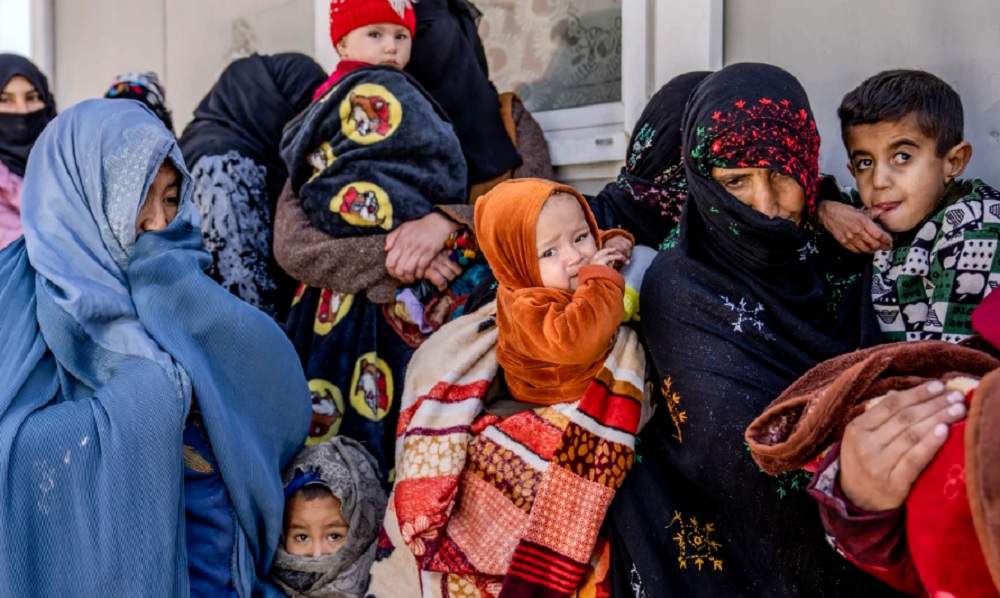Health
EU provides extra $41 million for polio vaccines, child protection in Afghanistan

The European Union announced this week that it will provide an additional $26 million for polio vaccines and another $15.6 million for child protection in Afghanistan.
According to a statement issued by the EU, the funding for child protection will specifically be aimed at caring for migrant children at risk of violence, exploitation and abuse.
As Afghanistan’s economic and humanitarian situation continues to deteriorate, children across the country face violence and other threats to their safety, forcing them to make desperate decisions in order to survive, the EU’s statement read.
Many children and young people feel forced into labor, and some choose to take the risky journey out of Afghanistan. Last year, 88 percent of households had at least one child working outside the home under difficult conditions, the EU stated.
“The dangerous journey for children across borders, especially when traversed alone, places these migrant children at risk of violence, exploitation, and abuse,” says Andreas von Brandt, EU Ambassador to Afghanistan.
“That is why the EU is contributing an additional €15 million to UNICEF, to help identify boys and girls returning to Afghanistan who need help, and children at risk of migration, and give them options other than migration or labor.”
This money, provided as a continuation of EU support since 2018, will allow UNICEF to:
Provide psychosocial support to 18,000 unaccompanied minors, trace their families, ensure they are reunified and support them to reintegrate into their communities.
Provide vocational training, small business start-up or apprenticeships for 7,500 children and 500 adults.
Provide cash-based assistance to over 4,600 households most in need.
Reach out to over 230,000 community members to discuss the dangers of child migration and how it can be prevented or addressed.
Reach out to 140,000 men and women on preventing gender-based violence.
In addition, EU has contributed a combined $26 million to UNICEF and the World Health Organization to support polio vaccination campaigns across the country, especially at borders where children may be transiting.
“Afghanistan is one of the two remaining polio endemic countries in the world, and transmission often occurs when children move from Afghanistan to Pakistan and back, causing them to miss their regular vaccination appointments,” says Mohamed Ayoya, UNICEF Representative in Afghanistan.
“These funds will allow UNICEF and WHO to strengthen polio vaccination efforts to ensure all children in the country, and those crossing transit points, are vaccinated against polio.”
Health
Balkh health officials report sharp increase in number of cancer patients

Balkh Public Health Department officials say there has been a significant increase in the number of patients with cancer in the province.
“In 1401, about 2,613 OPD (out patient department) cases were registered with us. In 1402, these figures were 4,912 cases,” said Ehsanullah Kaliwal, the head of the oncology department at Balkh Regional Hospital.
Some doctors say genetic factors, environmental pollution, arbitrary use of medicines, and excessive consumption of meat were reasons for the sharp increase.
One doctor said cancer was also hereditry.
However, a large percentage of cancer patients in Balkh have stomach cancer. Many of them have appealed for the government to improve treatment facilities.
According to health officials, in the first month of this solar year (April), 423 cancer patients visited this hospital for treatment.
Health
Majority of Afghans with mental disorders are women: officials

Based on last year’s data, 52 percent of people with mental disorders in Afghanistan are women, the Ministry of Public Health said.
However, after the Islamic Emirate took over the country and with the improvement of nationwide security and the provision of better health services, mental disorders have decreased, the ministry said.
“Overall, the mental security of men and women in Afghanistan is not ensured and their mental security is disturbed. According to the figures shared with us, in 2023, 52 percent of the visitors for mental disorders were women,” said Sharaft Zaman Amarkhil, the spokesperson of the Ministry of Public Health.
“Generally speaking, we can say that compared to the past, the instances of mental illnesses have decreased,” he added.
People suffering mental disorders mostly refuse to share their problem, willingly or unwillingly.
“There are many problems at home; We are poor. I finished school, but didn’t find any job,” Ansar, a mentally ill person, said.
According to the World Health Organization (WHO), half of Afghanistan’s population suffers from mental distress.
Factors such as unemployment, poverty, domestic violence, ban on girls’ and women’s education and work, and drugs are said to be key contributors to mental distress.
Health
Over 1 million women in Afghanistan malnourished last year: WFP

A total of 1.2 million women in Afghanistan were malnourished last year, the U.N. World Food Programme (WFP) said on Thursday.
Mona Shaikh, head of nutrition at WFP Afghanistan, said that the number of malnourished women is expected to increase this year.
On malnourished children, she said that their number will reach 3 million this year, but WFP will be able to assist only 1.6 million of them.
WFP warned that after foreign assistance cuts last year, it saw a rise in children’s admissions to malnutrition clinics in Afghanistan.
More than 23 million people are in need of humanitarian assistance in Afghanistan this year, according to the United Nations. Over half of them are children.
-

 Sport4 days ago
Sport4 days agoACL fever grows as fixtures finalized
-

 World4 days ago
World4 days agoUS will not take part in any Israeli retaliatory action against Iran
-

 Latest News4 days ago
Latest News4 days agoOver 50 people dead in traffic accidents over Eid
-

 Latest News4 days ago
Latest News4 days agoUS identifies Kabul airport suicide bomber
-

 Latest News4 days ago
Latest News4 days agoGood rains enable DABS to increase power production in Kabul
-

 Business4 days ago
Business4 days agoAfghanistan-Kazakhstan chamber of commerce opens in Herat
-

 World3 days ago
World3 days agoIsraeli military vows response to Iran attack as calls for restraint mount
-

 Latest News3 days ago
Latest News3 days agoPakistani police give Afghans in Balochistan one day to leave
























